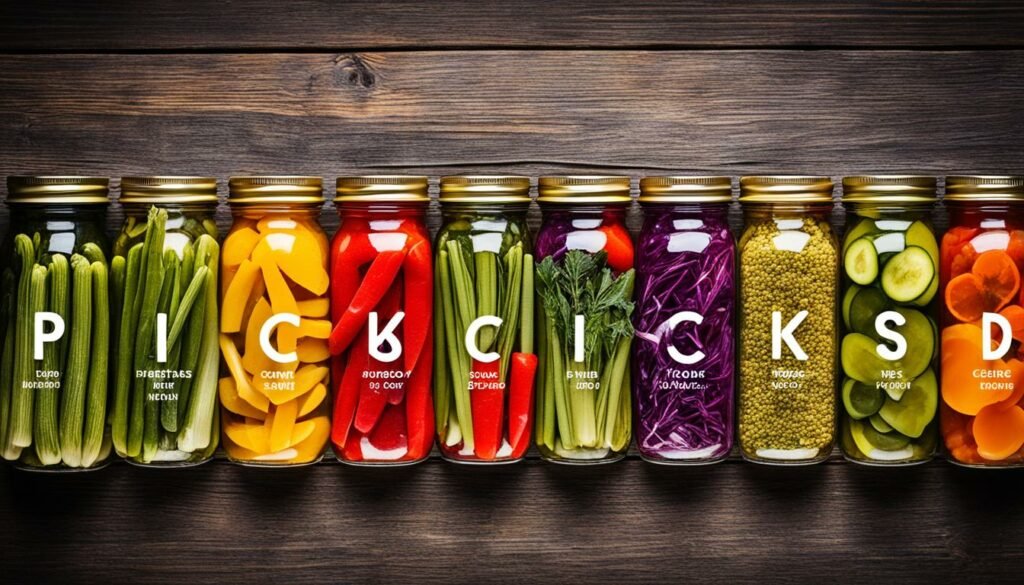Did you ever think about how people in the past kept food fresh? The secret was pickling. It’s an ancient way of preserving food. Pickling has played a big part in cooking traditions for many years.
The idea that such a simple method could do so much to our food is amazing. Pickling not only makes food last longer but also boosts its taste. It even adds health benefits. You can find pickled goodies, like zesty dill pickles and hot kimchi, all over the world.
Pickled cucumbers are the favorite pickled food in the United States. But pickling is about more than just cucumbers. People pickle everything from veggies to meats and fruits. This method of preserving food is loved by those at home and chefs worldwide.
Understanding Pickling: An Ancient Preservation Technique
I’ve always been intrigued by pickling. It’s a method of preserving food that’s been used for thousands of years. This tradition is an essential part of our food history.
What is pickling?
Pickling is a way to preserve food. It involves soaking the food in a mix that can have salt, acid, or alcohol. This process makes food last longer and taste better. People have pickled food to keep it safe for eating before fridges were common.
Brief history of pickling
Pickling began over 6,000 years ago. The first known pickle was made in Mesopotamia around 2030 BC. It has helped keep food edible on long trips and through cold winters.
- 18th-19th centuries: Advancements in pickling methods by Nicolas Appert, Peter Durand, and Louis Pasteur
- 1893: H.J. Heinz popularizes pickles at the Chicago World Fair
- Today: Pickling remains a beloved traditional culinary practice
Difference between pickling and fermenting
Pickling and fermenting are different. Pickling uses acid to keep food safe, while fermenting relies on good bacteria. This makes the food taste different and adds to its nutrition.
| Aspect | Pickling | Fermenting |
|---|---|---|
| Process | Soaking in acidic solution | Bacterial action on sugars |
| Preservation agent | Vinegar or brine | Lactic acid |
| Flavor profile | Tangy, sour | Complex, sour |
| Probiotic content | Limited | High |
Knowing about these processes helps us understand the value of pickles. They make food taste better and keep it safe to eat today, just as they did in the past.
Benefits of Pickling as a Food Preservation Method
Pickling is a great way to keep food fresh for long. This method has more benefits than just stopping spoilage. Let’s look at why pickling matters for our meals today.
Extended Shelf Life
Pickling keeps food fresh for months or even years. This is much longer than using a fridge or freezer. It’s a big win for battling food waste.
- Pickled foods can last several months to years
- Outlasts typical refrigerator or freezer preservation
- Reduces food waste significantly
Retention of Nutrients
Many think pickling loses food’s nutrients, but it actually keeps them. Vitamins and minerals get more concentrated when water is drawn out. Pickled food is packed with the stuff that’s good for you.
- High in Vitamin K, C, and A
- Provides calcium and potassium
- Contains antioxidants that boost immune system

Enhanced Flavor Profiles
Pickling does more than keep food; it adds vibrant flavors. Simple ingredients turn into tangy, unique tastes. Your meals become more exciting with pickled treats.
| Pickle Type | Flavor Profile | Common Uses |
|---|---|---|
| Dill Pickles | Tangy, herbal | Sandwiches, burgers |
| Pickled Onions | Sharp, sweet | Salads, tacos |
| Pickled Garlic | Mellow, savory | Antipasto, cooking |
In sum, pickling is a wise choice. It extends shelf life, keeps nutrients, and boosts flavor. It’s not just about preservation; it’s a culinary adventure in your own kitchen.
Nutritional Advantages of Pickled Foods
Pickled foods have lots of benefits for our health. They are tangy and tasty, making them a great addition to meals. The pickling process helps keep important nutrients in the food.
Pickled foods are great because they have few calories. This is good news for those trying to lose weight. Plus, they’re full of fiber which keeps our stomachs satisfied.
When foods are pickled, they become rich in vitamins and minerals. This means we get a lot of nutrition from eating pickled foods. Let’s see what some common pickled foods offer:
| Pickled Food | Key Nutrients | Health Benefits |
|---|---|---|
| Cucumber Pickles | Vitamin K, Vitamin A | Bone health, Vision support |
| Sauerkraut | Vitamin C, Iron | Immune boost, Blood health |
| Pickled Beets | Folate, Manganese | Cell growth, Metabolism support |
Pickled foods can be a good choice for managing blood sugar. The vinegar in pickles helps keep sugar levels steady. This makes them a wise pick for diabetics and those looking to avoid sugar spikes.
The fruits and veggies used in pickling are full of antioxidants. These help our bodies fight illness and stay healthy. The pickling process makes sure we don’t lose these important nutrients.
Another benefit of pickling is that it keeps the food safe. The acid in pickled items stops harmful bacteria from growing. This makes pickled goods a good, safe food to store for a while.
- Low in calories
- High in fiber
- Rich in concentrated vitamins and minerals
- Helps control blood sugar
- High in antioxidants
- Promotes food safety
Adding pickled foods to our meals can bring us many health benefits. We also get to enjoy their tasty, unique flavors. It’s a win-win for our taste buds and our health.
Probiotic Properties: Boosting Gut Health
Through my journey, I’ve learned that pickled foods offer outstanding probiotic benefits. The small microorganisms in these foods are essential for our health. Now, let’s explore how these tiny good bacteria support our well-being.
Good Bacteria in Pickled Foods
Beneficial bacteria are abundant in pickled foods. They help with digesting food, making nutrients easier for our bodies to use. Furthermore, they produce vitamins K and B, which are good for us. Research (Yan et al., 2023) shows that pickles’ bacterial strains benefit our gut bacteria.
Impact on Digestive System
The probiotic features of pickled foods do wonders for our digestion. They improve the balance in our gut, reducing swelling, and making digestion better. Regularly eating pickled vegetables brings several advantages:
- Better nutrient absorption
- Reduced bloating and gas
- Improved bowel movements
- Lower risk of digestive issues
Potential Immune System Benefits
The benefits of pickled foods stretch beyond our stomachs. The healthy bacteria in these foods can strengthen our immune system. They help make antibodies, which fight off unwanted harmful guests. A study (Bousquet et al., 2020) mentioned they could even help battle severe COVID-19 symptoms.
| Benefit | How Pickled Foods Help |
|---|---|
| Improved Digestion | Probiotics break down food more efficiently |
| Stronger Immune System | Stimulates antibody production |
| Better Nutrient Absorption | Enhances uptake of vitamins and minerals |
| Reduced Inflammation | Balances gut microbiome |
To get these benefits, I try to have 2 tablespoons to ¾ cup of pickled veggies every day. By doing so, I not only eat tasty food but also take care of my gut and overall health. Pickled foods are a wise pick for anyone wanting to naturally better their health.
Eco-Friendly and Cost-Effective Food Preservation
Pickling is a fine way to keep food fresh and help our planet. It reduces food waste by preserving fruits and veggies. This comes in handy during the winter when fresh, local items are scarce.
Making pickles at home is simple and doesn’t cost much. You’ll need just a few ingredients to start. I enjoy buying fruits and veggies when they are cheap and abundant. This approach saves me money. Also, it avoids the need for energy-heavy freezing methods.
Pickling reflects in my smaller grocery bills. I don’t spend a lot on off-season produce. I also waste less food. By choosing this method, I save money and aid the planet. This makes me happy about my food-saving choices.
FAQ
What is pickling?
Pickling is a technique to keep food fresh. You soak it in vinegar or brine, which is salty water. This method makes food last longer and taste better.
How does pickling differ from fermentation?
Pickling uses an acidic liquid to keep food from spoiling. Fermentation, on the other hand, breaks down sugars with bacteria. This makes some pickled foods also fermented, but not the other way around.
What are the benefits of pickling as a food preservation method?
Pickling prolongs food’s life while keeping nutrients intact. It makes flavors more interesting and adds good bacteria. Pickling is also good for the environment and saves money.
How does pickling retain nutrients?
Pickled foods lock in important vitamins since the water is drawn out. This means they’re rich in vitamin C and A. These vitamins keep your skin healthy and your immune system strong.
What are the benefits of probiotics in pickled foods?
Pickled foods with probiotics help your gut. Probiotics improve digestion and health. They even make some vitamins that your body needs.
Is pickling an eco-friendly preservation method?
Pickling is good for the planet and your wallet. It keeps food from being thrown away and doesn’t use a lot of resources.
